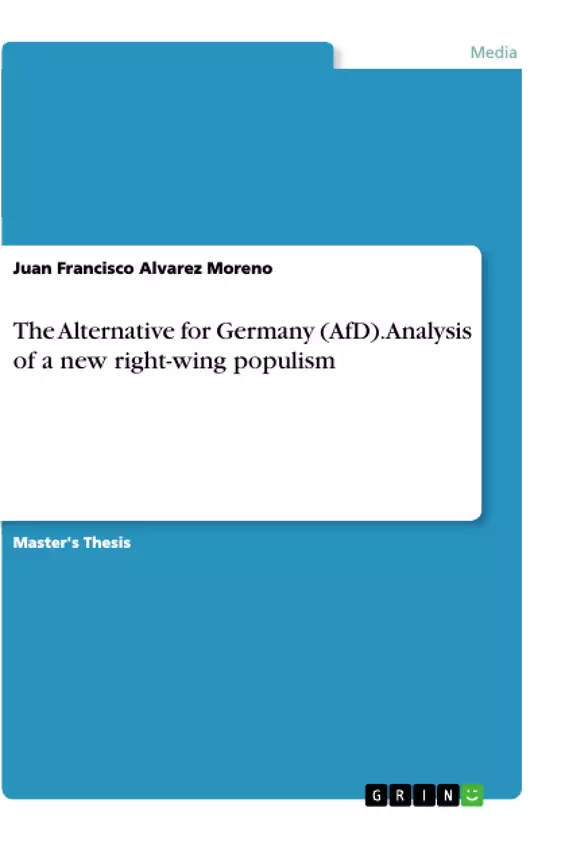The aim of this work is to examine how the political communication of the recently created German political party "Alternative for Germany" (Alternative für Deutschland) can be understood as a form of right-wing populist discourse. The analysis seeks to gain knowledge in how their discourses challenge the established ones in Germany. The discourses of the AfD are then examined in their wider context in a discussion about their social implications in Germany and Europe.
The study design is devised following Norman Fairclough’s approach to critical discourse analysis, which acts both as an analytical and methodological framework. Under a social constructionist paradigm, the corpus of selected political messages is analysed using a methodological toolbox that is based on Fairclough’s work and looks after three levels of analysis: text, discursive practice and sociocultural practice. This framework is enhanced with the findings and theoretical considerations of Ruth Wodak’s work on right-wing populist discourses. While the first two levels follow a constricted methodological guideline in order to examine how the AfD discourses can be understood as right wing-populism and how they challenge established discourses, the last level opens a discussion about how they draw upon and reproduce broader ideological-discursive formations and social practices.
Inhaltsverzeichnis (Table of Contents)
- Introduction.
- Context: history and understanding of the AfD.
- Theoretical & analytical framework
- CDA as ontology, theory and analytical tool
- Social constructionism
- Critical discourse analysis
- Fairclough's approach to critical discourse analysis
- Representations
- Theories of populism
- Agenda-Setting
- Literature review of previous research
- Wodak's analysis of right-wing populist discourse
- Previous findings about the discourse of the AfD
- Methodology, method and data selection.
- Why a social constructionist approach?
- Study design: CDA as a methodological framework
- Discursive practices
- Text
- Sociocultural practice
- Sample selection and corpus construction.
- Reflection on methodology & ethics
- Research results & analysis
- Level of discursive practice
- Interdiscursivity: Discursive types and genres.
- Intertextuality
- Presuppositions
- Textual level of analysis
- Themes identified
- Transivity
- Word meaning
- Modality
- Metaphors
- Ethos
- Discursive strategies in the text
- Summarizing the analysis
- Discussion
Zielsetzung und Themenschwerpunkte (Objectives and Key Themes)
This thesis aims to analyze the political communication of the AfD, a newly established German political party, as a form of right-wing populist discourse. The study investigates how the AfD's discourses challenge established political narratives in Germany and explores their social implications within Germany and Europe.
- Understanding the AfD's political communication as a form of right-wing populist discourse.
- Examining how the AfD's discourses challenge established narratives in German politics.
- Analyzing the social implications of the AfD's discourse in Germany and Europe.
- Exploring the use of right-wing populist discursive strategies by the AfD.
- Investigating the relationship between the AfD's discourse and broader ideological-discursive formations and social practices.
Zusammenfassung der Kapitel (Chapter Summaries)
- Introduction: Introduces the topic of the thesis and outlines its main objectives, research questions, and methodology.
- Context: history and understanding of the AfD: Provides historical background and contextual information about the AfD's emergence and development, discussing its political ideology and key themes.
- Theoretical & analytical framework: Outlines the theoretical and methodological framework of the study, including critical discourse analysis (CDA), social constructionism, Fairclough's approach to CDA, theories of populism, and agenda-setting.
- Literature review of previous research: Reviews existing research on right-wing populist discourse, focusing on Wodak's analysis of right-wing populist discourse and previous studies on the discourse of the AfD.
- Methodology, method and data selection: Explains the research design, including the methodological framework, data collection methods, and sample selection. It also discusses the ethical considerations involved in the research.
- Research results & analysis: Presents the analysis of the AfD's political communication using Fairclough's approach to CDA. It examines the discursive practices, textual features, and sociocultural context of the selected corpus of political messages. The chapter explores themes such as the misdoing of the elite, the pride of the German nation, and immigration as a problem.
- Discussion: Discusses the findings of the research and their implications for understanding the nature of right-wing populism in Germany. It also considers the social and political consequences of the AfD's discourse.
Schlüsselwörter (Keywords)
The core concepts and key terms explored in this thesis include right-wing populism, critical discourse analysis, Fairclough's approach to CDA, social constructionism, AfD, Germany, political communication, discourse analysis, immigration, nationalism, social implications, ideological formations, discursive practices, and social practices.
Frequently Asked Questions
What is the main focus of this thesis on the AfD?
The thesis analyzes the political communication of the Alternative for Germany (AfD) to understand how it functions as a form of right-wing populist discourse.
What methodology is used to analyze the AfD's discourse?
The study uses Norman Fairclough’s approach to Critical Discourse Analysis (CDA), focusing on three levels: text, discursive practice, and sociocultural practice.
Which theoretical frameworks support the research?
In addition to Fairclough's CDA, the research incorporates Ruth Wodak’s work on right-wing populism, social constructionism, and theories of agenda-setting.
What are the identifying themes in the AfD's political messages?
Identified themes include the "misdoing of the elite," national pride for Germany, and framing immigration as a significant problem.
How does the AfD challenge established political narratives in Germany?
The analysis explores how the AfD uses specific discursive strategies and metaphors to disrupt traditional political discourse and introduce populist ideological formations.
What social implications does the research discuss?
The thesis discusses how the AfD's communication reproduces broader ideological formations and its potential consequences for social practices in Germany and Europe.
- Citation du texte
- Juan Francisco Alvarez Moreno (Auteur), 2017, The Alternative for Germany (AfD). Analysis of a new right-wing populism, Munich, GRIN Verlag, https://www.grin.com/document/535706



